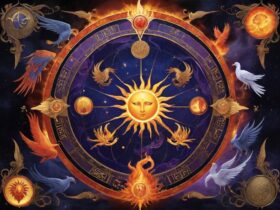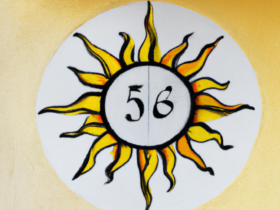Astrology is an ancient practice used for centuries to gain insight into people’s personalities and predict the future. At its core, astrology studies the positions and movements of celestial bodies in relation to human affairs. The zodiac is one of the most essential concepts in astrology, and it is a key tool for understanding the influences of the stars and planets on our lives.
“Zodiac” meaning
The word “zodiac” comes from the Greek word “zōdiakos,” which means “circle of animals.” It is a circle of twelve 30-degree divisions of celestial longitude centered upon the ecliptic: the apparent path of the Sun across the celestial sphere over the year. The paths of the Moon and visible planets also remain close to the ecliptic, so the zodiac is a convenient reference for locating and predicting the positions of celestial objects in the sky.
12 signs of the Zodiac
The zodiac is divided into 12 signs, each associated with a particular constellation and time of the year. The signs are named after various animals and deities, considered significant in people’s lives. The 12 zodiac signs are Aries, Taurus, Gemini, Cancer, Leo, Virgo, Libra, Scorpio, Sagittarius, Capricorn, Aquarius, and Pisces.
Each zodiac sign is associated with a particular set of characteristics, strengths, and weaknesses. For example, Aries is considered to be a fire sign, and it is associated with leadership, courage, and determination. Taurus, on the other hand, is considered to be an earth sign, and it is associated with stability, practicality, and security. Understanding the characteristics of your zodiac sign can help you gain insight into your personality and behavior.
The positions of the stars and planets at the time of a person’s birth are thought to directly influence their character and destiny. This is the basis of natal astrology, also known as horoscope astrology. Astrologers use the positions of the stars and planets at the time of a person’s birth to create a natal chart, which is a map of the sky at that particular moment. This chart is used to gain insight into the person’s personality, relationships, and potential future.
Zodiac cycles
Astrology also involves understanding the cycles of the zodiac, which are determined by the positions of the Sun, Moon, and planets. For example, the Sun moves through the 12 zodiac signs over a year. When the Sun is in a particular sign, it is said to be in that sign’s “season,” It is thought to have a specific influence on the people born under that sign. Similarly, the Moon moves through each of the 12 zodiac signs over a month, and it is thought to have a particular influence on people’s emotions and relationships.
In addition to natal and seasonal astrology, predictive astrology uses the positions of the stars and planets to predict future events. Astrologers use various techniques to make predictions, such as transits (the movement of a planet through the zodiac), progressions (the direction of the planets relative to a person’s natal chart), and returns (the return of a world to its position in a person’s natal chart).
Astrology is a complex and multifaceted subject that can take years to master. However, understanding the basics of the zodiac system is a great starting point for anyone interested in learning more about astrology. By understanding the characteristics of the 12 zodiac signs, the cycles of the zodiac, and the concepts of natal and predictive astrology, you will be well on your way to gaining a deeper understanding of the influences of the stars and planets on our lives.
Self-reflection tool
It’s important to note that astrology is not considered a science by the majority of the scientific community and there is no scientific evidence that supports predictions based on astrological principles. Astrology should be viewed as a tool for self-reflection and self-awareness rather than a means of predicting the future or determining someone’s fate.
Another important aspect is that astrology is not limited to your sun sign. Your entire natal chart should be taken into account for a more complete understanding of yourself and how the cosmos may be influencing you.
As you delve deeper into astrology, you will discover how it can be used to gain insight into yourself and the world around you. Whether you’re looking to improve your relationships, advance your career, or simply gain a deeper understanding of yourself, astrology can be a valuable tool for personal growth and self-discovery.
Conclusion
In conclusion, the zodiac system is an integral part of astrology, and understanding the basics can help you navigate the mystical world of astrology. It’s a fascinating and complex subject that can take years to master, but even a basic understanding of the zodiac can help you gain insight into yourself and the world around you. Remember to keep an open mind and view astrology as a tool for self-reflection rather than a means of predicting the future.




















Leave a Reply